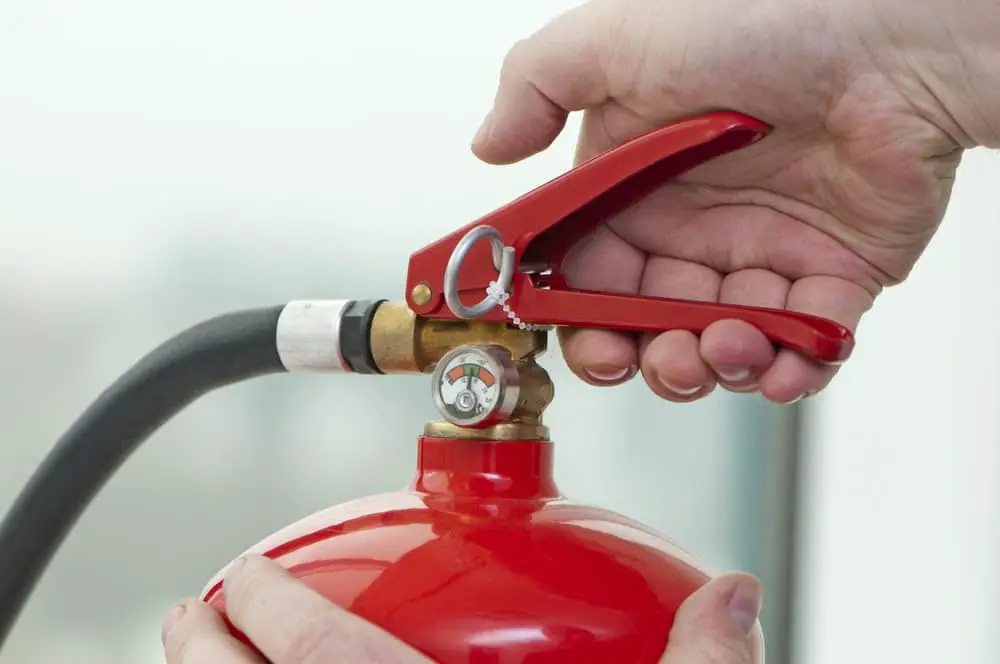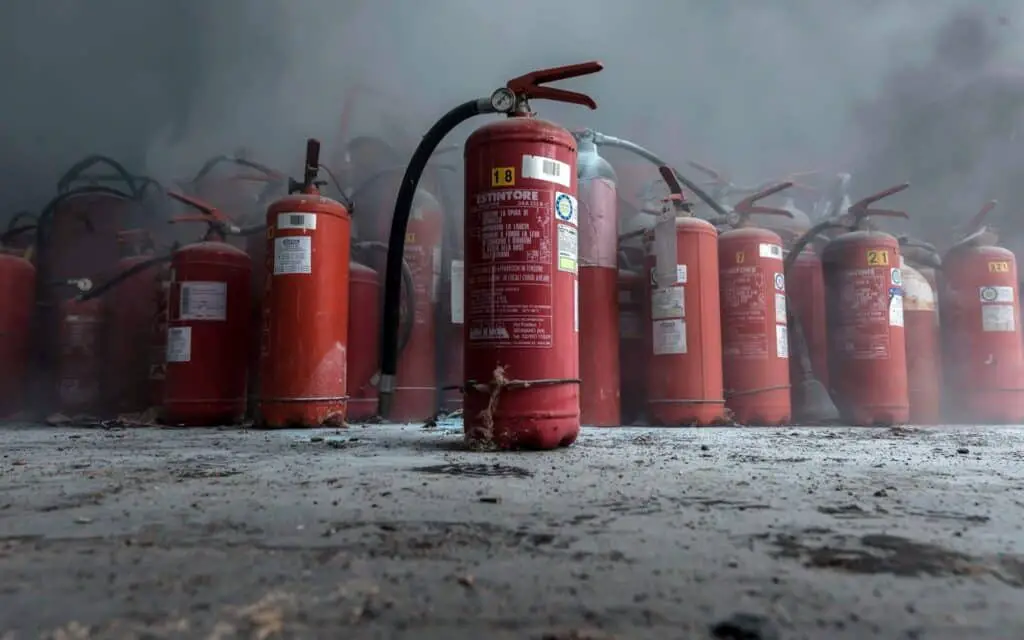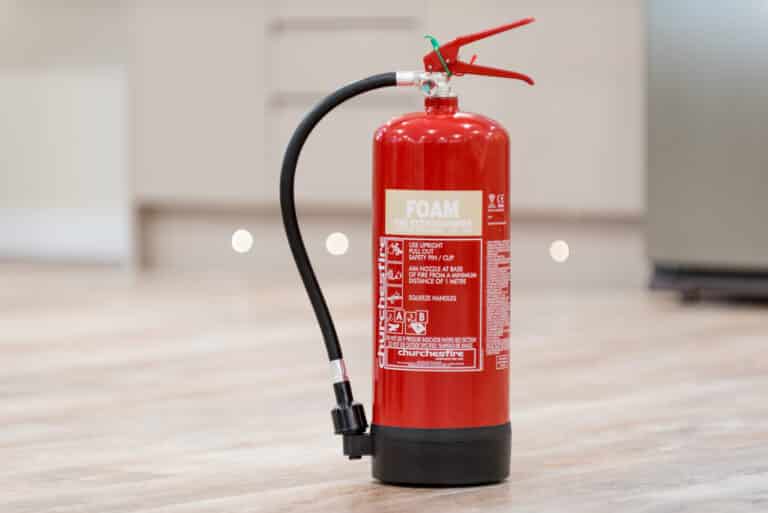Introduction
How Long Is A Fire Extinguisher Good For: Fire safety is essential for personal and property safety. Fire extinguishers are essential for fire prevention and control. These portable gadgets fight fires fast and effectively, although their effectiveness can fade over time. It Fire extinguishers need frequent maintenance and inspections to perform properly.
Fire extinguishers’ lifespans depend on their type, production date, maintenance, and storage. Fire extinguishers typically have a manufacturer’s recommended shelf life, which indicates the period during which they are expected to operate optimally. The most common types of fire extinguishers, such as those classified as ABC or BC, typically have a recommended shelf life of 5 to 15 years.
Actively used fire extinguishers have a shelf life. This does not mean the extinguisher is dead .Fire extinguishers need regular readiness checks. Pressure checks, visual inspections, recharge/replace. Trained extinguisher testers perform these standard testing.

How do you check fire extinguishers for expiration?
Check the service label for annual service intervals and inspect the extinguisher for damage, rust, and corrosion. The manufacturing date, usually stamped on the body or service label, can also help determine if the extinguisher is due for replacement.
Visual Inspection: Conduct a thorough visual inspection of the fire extinguisher. Look for signs of physical damage such as dents, rust, or corrosion . Extinguishers that are damaged or compromised should be replaced.
Pressure Gauge: Most fire extinguishers have a pressure gauge that indicates the pressure level of the extinguishing agent .If the pressure gauge reads too high, too low, or in the red zone, the extinguisher may be malfunctioning.
Tampering or Seals: Check for any signs of tampering or broken seals on the fire extinguisher. Broken seals could indicate inappropriate use or handling, rendering the extinguisher unreliable.
Maintenance Records: Verify fire extinguisher maintenance. Extinguishers need frequent maintenance, inspections, and servicing. Without records or maintenance, the extinguisher may need replacement.
Is there expiration date on fire extinguishers?
Even though they don’t have a real “expiration date,” most standard fire extinguishers last between 10 and 12 years. Every 10 years, you should get a new disposable (non-rechargeable) fire extinguisher.
Fire extinguishers need daily maintenance to perform properly. Experts should always check the fire extinguisher’s pressure, physical stability, and any signs of damage or degradation, no matter how old it is.
Store fire extinguishers safely per manufacturer’s instructions.
Local fire codes may require regular extinguisher service or testing. Extinguishers may need annual hydrostatic testing or inspection, depending on location and type.
Maintaining fire extinguishers within their shelf life makes them ready to use. The manufacturer or fire safety specialists can advise extinguisher use and maintenance.
Replace fire extinguishers how often?
Every 12 years
Even in pristine condition, a fire extinguisher should be replaced every 12 years and may need to be recharged after 6. Anyone who lights candles, cooks often or just has matches in the house can benefit from a nearby fire extinguisher.
Any age fire extinguisher needs regular inspections and maintenance to check its condition and operation. Monthly visual inspections should reveal degeneration, corrosion, and other issues. Annual or local fire inspections and maintenance should be professional.
Fire extinguishers assess agent pressure via gauges. Keep the gauge within limits with frequent pressure checks. Extinguishers with high or low pressure should be checked or replaced.
Hydrostatic testing may be needed for pressurized fire extinguishers. We test pressurized extinguishers. Hydrostatic testing frequency varies by extinguisher and location. Many need it every 5–12 years.
Environment affects fire extinguisher lifespan. Extreme heat, humidity, corrosives, or damage can limit their efficiency. Store fire extinguishers according to manufacturer directions to prolong their life.
How long does a fire extinguisher last after you start using it?
How long do fire extinguishers last? The average lifespan of a powder, foam or water extinguisher is usually between 10 and 12 years. This is based on the extinguisher being in good condition with no corrosion or damage. After this time, the fire extinguisher should be replaced with a new one.
Size and intensity of the fire: Fire size and strength affect extinguisher life. A little fire may extinguish fast, but a large one may take longer. Assess the demand for fire extinguishers and professional fire services.
Proper Application: The effectiveness of a fire extinguisher greatly depends on the proper application technique. It is important to aim the extinguisher at the base of the fire and sweep back and forth, effectively smothering the flames. Adequate training and knowledge of how to use a fire extinguisher correctly can help maximize its effectiveness.
Limited Quantity: Fire extinguishers have a limited quantity of extinguishing agent contained within them. Once this supply is depleted, the extinguisher will no longer be able to suppress the fire. Therefore, it is crucial to monitor the extinguisher’s pressure gauge and discontinue its use if the pressure drops too low or reaches empty levels.
Professional Evaluation: Even if a fire extinguisher appears empty, a fire safety technician should inspect and replenish it. They can inspect, refill, and maintain the extinguisher for future usage.

What is the best fire extinguisher for home use?
If you are searching for a powerful, easy-to-use fire extinguisher, you can’t go wrong with our best overall pick, the Amerex B500.
BC fire extinguishers are for homes with flammable liquid and electrical fire risks but little combustible material. They are effective against flammable liquid fires (Class B) and electrical fires (Class C). BC extinguishers also use a dry chemical agent.
Water Mist Fire Extinguisher
Water mist extinguishers are suitable for homes where traditional extinguishing agents may cause collateral damage. They are effective against Class A fires involving ordinary combustible materials. Water mist extinguishers discharge ultra-fine water droplets, which cool the fire and displace oxygen, extinguishing the flames.
CO2 (Carbon Dioxide) Fire Extinguisher
CO2 extinguishers are ideal for fires involving electrical equipment and flammable liquids. They are suitable for Class B and Class C fires. CO2 extinguishers work by displacing oxygen and removing heat from the fire. It’s important to note that CO2 extinguishers are not suitable for Class A fires involving ordinary combustibles.
Wet Chemical Fire Extinguisher
Wet chemical extinguishers are for Class K kitchen oil and fat fires. A special chemical combines with cooking oil to generate a soapy solution that prevents re-ignition.
When should you check fire extinguishers in a year?
Every year, NFPA 10 requires a licensed fire extinguisher inspector to perform a comprehensive maintenance check. A licensed fire protection company must examine fire extinguishers annually, not monthly.
Annual Professional Inspections
Schedule a professional inspection of all fire extinguishers at least once a year or as recommended by local regulations. Trained technicians should test each extinguisher thoroughly. They will check for internal issues, such as clogged nozzles or discharged extinguishing agent, and perform any necessary maintenance or recharge.
Hydrostatic Testing
Pressurized fire extinguishers need hydrostatic testing. High-pressure testing checks the extinguisher’s canister. Based on the fire extinguisher and local laws, hydrostatic testing is needed every 5–12 years. Ask a fire safety worker or producer when hydrostatic testing should occur.
Post-Use Inspection
Every fire extinguisher used, even briefly, should be checked and maybe replaced. After use, it is advisable to contact a fire safety professional to evaluate the extinguisher and ensure it is ready for future emergencies.
Additional Inspections
In certain environments or industries, additional inspections may be required. For example, some high-risk settings or specific applications may necessitate more frequent inspections or specialized testing. It is important to be aware of any industry-specific or local requirements and adhere to them accordingly.
Do I need to refill fire extinguisher every year?
After usage, refill fire extinguishers. Regularly replenish even unused fire extinguishers. Refills occur every 6-12 years after production.
Discharge or Partial Use: Quickly charge a half-used fire extinguisher. Partially used extinguishers should be reported to fire safety experts promptly. Check and restock.
Damage from air Loss: Fire extinguishers may slowly lose air over time, which can make them less effective .Refill or recharge the fire extinguisher if its pressure scale is below the safe range or practically empty.
Different fire extinguishers refill differently: Dry chemical extinguishers merely need extra chemicals, whereas water or foam ones may need a full refill. The manufacturer’s instructions or a fire safety specialist can calculate extinguisher refill.
Manufacturer Recommendations: The fire extinguisher’s maker will usually give you instructions on how to maintain it and when to replace it. It is suggested that you follow these suggestions to make sure the extinguisher works properly.

Conclusion
The fire extinguisher will work best for a certain amount of time after the maker suggests a shelf life. Remember that this is an advice for checking and maybe replacing the fire extinguisher, not an expiration date. Type, maintenance, and storage affect how long an extinguisher lasts.
Regular maintenance and inspections are crucial to keeping fire extinguishers in good working condition. Trained professionals should do visual checks, pressure checks, and, if necessary, refilling or replacing. These measures ensure that the extinguisher gas cylinder is ready for use when a fire emergency arises. Proper storage conditions also play a significant role in extending the lifespan of a fire extinguisher.
Ultimately, the goal is to have reliable fire extinguishers readily available in case of an emergency. By understanding the lifespan of a fire extinguisher and following proper maintenance and storage practices, individuals and organizations can maximize the effectiveness of these crucial fire safety devices. Storing the extinguisher in a designated location away from extreme temperatures, direct sunlight, and potential hazards is essential for preserving its integrity.

